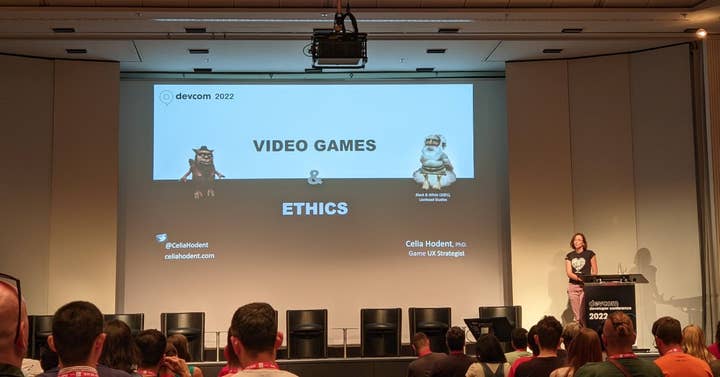Defining limits for loot boxes: "We need to understand the pressures we're putting into games"
In a Devcom talk, Celia Hodent called on the industry to better reflect on the potential effects of loot boxes
At Devcom today, game UX strategist and cognitive science expert Celia Hodent gave a talk about ethics in games, highlighting shady practices and grey areas of game development, and emphasising the need for the industry to better define limits when it comes to monetisation practices.
"It's hard in games to determine where that line is," Hodent said. "But my point is we should start defining those lines, defining when we are crossing one, so that we can make sure we offer games that are going to be accessible, inclusive, and that are going to be respectful to players."
Her talk highlighted good UX practices, focusing in part on loot boxes and at what point they start being problematic.
"Loot boxes are a form of intermittent rewards with a variable ratio reinforcement schedule," she explained. "Rewards based on your actions are called ratios. A very direct example of fixed ratio are achievements: if you kill ten zombies with the lawn mower, then you get this achievement unlocked. So, you know that you have to do this action ten times, precisely, in order to get it. So it's fixed, you can predict exactly how you can get it and it's based on your action.
"Variable ratio is anything that could be a loot box. It doesn't have to be a loot box but it's a reward that you get, and you have to open it, but you don't know what you're going to get. It's anything that is like a loot box, a chest that you have to open, or a mystery bonus like in Mario Kart."
"Nearly all games are going to use randomness to make it more fun and engaging – so it's not a problem by itself. The problem starts when you know you're going to use something – in many cases more engaging – to monetise it"
She added that it's well known at this point that these types of rewards can be engaging to players, as that applies to any game that uses a dice throw or a draw of cards as part of its mechanics.
"Nearly all games, except maybe chess, are going to use randomness to make it more fun and engaging – so it's not a problem by itself," she said. "The problem starts when you know you're going to use something – in many cases more engaging – to monetise it, to encourage a conversion. And this is when this starts to be a little bit unethical, especially if you do that in a game when you have minors.
"Why? Because the brain takes a while to mature. The part of the brain that is controlling our emotions and regulating these emotions is the pre-frontal cortex. It's the last part of the brain to mature. It's entirely mature at around 25 years of age. The younger you are, the harder it is to manage your emotions.
"If you use loot boxes that have an emotional aspect, it's conditioning. So if you put loot boxes or pressures in your game to convert and you have a lot of kids or teenagers playing your game, it's a little bit problematic because you know it's going to be harder for them to regulate their emotions. and that's why there's a lot of discussions around regulating loot boxes."

And it's not just loot boxes, Hodent continued, as she highlighted several grey areas in game development that tap into problematic aspects and exploit human biases. One of them is scarcity, which we've seen a lot at play recently with things like Web3 and NFTs, the idea being to drive demand using the illusion of scarcity.
Another example would be fear of missing out – for example, organising a very short sales period for a game to drive interest.
"[There's also] loss aversion," Hodent added. "We are very averse to loss, it's actually more painful for us to lose something that we had versus the joy that we had to gain the equivalent. So when you give something to someone and say 'Well, you have to do another thing or you will lose all this progression,' it's capitalising on loss aversion."
She added that this is a particularly effective lever on teenagers, which is why it's problematic as they have a harder time regulating their emotions.
The last grey area Hodent mentioned is the anchoring effect: "We don't know how to make decisions in silos, so when we see a sale we might go for this item rather than another item that is [cheaper] because it looks like a better deal," she explained.
"So again, for games, it's complicated. Take time pressure, for example. If you remove that feature, do you still have a game? Is it really serving the gameplay? Or is it mostly serving the business cause? [Could] the game be actually fun without that pressure? And again, you have to understand that all that pressure that we put, for kids it's going to be even harder to manage.
"If you do a one-time event, if that event is just happening one day, or if you have to play every day in order to get the XP necessary to be able to get that reward, and it's only going to be in that season and that season is only during one month, and you have to play every day… This is probably crossing a line."
"We need to clearly understand what we're doing, the pressures we're putting into a game. We need to clearly understand what we're doing in terms of psychology so that we can know when we're crossing a line"
Similarly, Hodent warned of guilt tripping players when deleting an account or character, or when they're not able to login consistently.
She then called for the industry to try and better understand the emotions they put players through and think about consent when implementing such practices.
"If you have a game where you die all the time but the players know that this is what they're signing for, and this is what the game is known for, there's consent. So what we need to understand first is: is there consent from the players, do they know what they're getting into? And again, when we talk about children, consent is even more complicated because they might not understand and they might not be equipped to deal with certain emotions and pressures.
"So we need to clearly understand what we're doing, the pressures we're putting into a game, the frustrations we're putting in a game. We need to clearly understand what we're doing in terms of psychology so that we can know when we're crossing a line.
"First we need to identify these shady practices, we need to be able to understand why loot boxes can be problematic, what's the psychology behind it. And reconsider, or even avoid entirely for minors, stuff like guilt tripping, loot boxes tied to monetisation, capitalising on fear of missing out, loss aversion, punishing disengagement, auto-play.
"All these things can really backfire, as we've seen in the past, so it's also a danger for the business. Ask yourself: are the pressures designed in my game serving gameplay? Or are they mostly/only serving business goals?"

